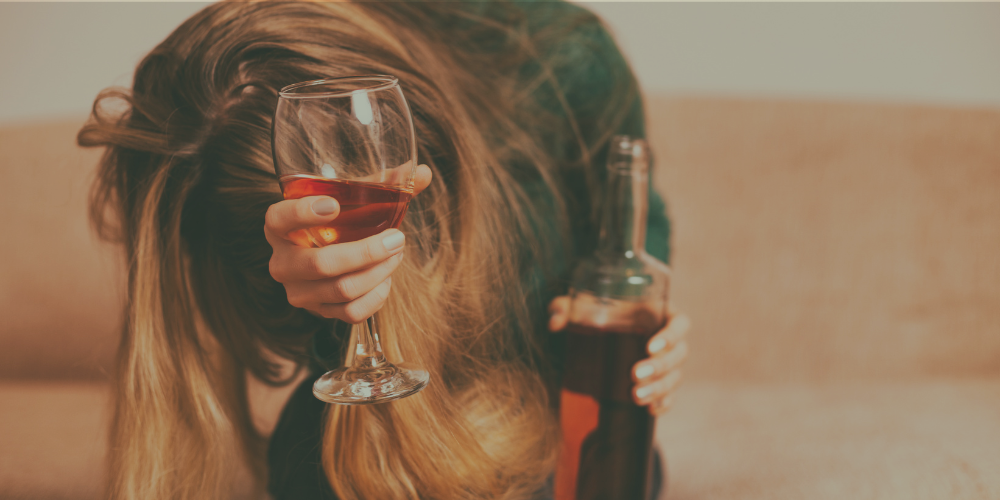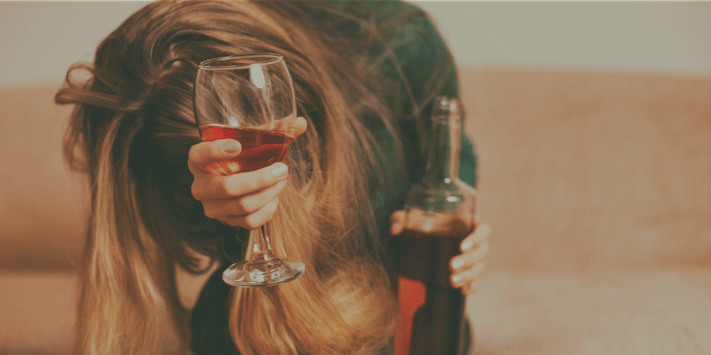What Really Happens When You Quit Drinking Alcohol?
Whether you’re quitting for a little while or you think that you may have a dependency or substance...

Many people find that they experience depression after quitting drinking alcohol. How are alcohol and depression linked, and why is depression a symptom of alcohol withdrawal?
Alcohol is a central nervous system depressant. The primary intoxicant in alcoholic beverages is ethanol, while water helps to dilute and make them more easily consumed.
When people drink alcohol, it enters their bloodstream immediately. Most people drink alcohol because they think it's safe - but that's actually not the case.
Drinking alcohol can lead to physical problems like liver disease, brain damage, addiction, and is associated with a number of cancers. It can also have negative psychological consequences such as aggression, anxiety, and depression.
Alcohol is also known to lower inhibitions, which can lead to making poor, risky decisions while under the influence.

Depression is a serious mental disorder that can dramatically reduce the quality of life of those who suffer from it. It affects people of all ages, backgrounds, and genders, and can be caused by a wide variety of factors, or a combination of factors.
According to recent studies, An estimated 21 million adults in the United States had at least one major depressive episode over the course of 2020.
It's often difficult to identify the symptoms of depression, because people may experience them in different ways. However, some common indications of depression include:
Alcoholism has long been associated with mental health problems. Heavy drinkers are more likely to experience anxiety, depression, social withdrawal, panic attacks, insomnia, and bipolar disorder.
Drinking alcohol initially raises dopamine and serotonin levels in the brain, causing feelings of euphoria at first, but afterwards will leave you feeling depleted of these feel-good neurotransmitters.
Alcohol is also a depressant, meaning that it slows down the activities in your brain that regulate your mood and emotions.
Does alcohol cause depression? Not necessarily, but it can. If you have a pre-existing mental health condition, alcohol can certainly make it worse.
Have you ever felt like you needed to drink to deal with your emotions? If that's the case, you're not alone. Many individuals turn to alcohol in order to cope with stress, anxiety, depression, and other difficult life circumstances.
However, drinking alcohol can make your depression worse, and if you have depression, you are more at risk for developing an alcohol use disorder. It’s common for these two disorders to go hand-in-hand, and each have the power to make the other disorder worse.
%20(6).png?width=1000&height=500&name=Blog%20Cover%20(1000%20%C3%97%20500%20px)%20(6).png)
Having an alcohol use disorder and a mental health disorder at the same time is known as dual diagnosis, or a co-occurring disorder.
The link between both alcohol abuse and depression seems to stem from the way that alcohol affects our brain chemistry. When we drink, it releases endorphins - hormones responsible for pain relief, stress management, and euphoria.
This self-medication cycle leads to continued regular intake – until alcoholism sets in full swing.
Many people who quit drinking experience significant mental and emotional changes and experiencing depression after giving up drinking is actually a very common withdrawal symptom.
Alcoholism is a disease that affects the brain and body in ways you may not have imagined.
If dopamine levels are consistently raised by alcohol, your brain will become dependent on alcohol for dopamine production.
Over time, your brain creates less of its own dopamine to try to balance out the levels it is receiving from alcohol.
%20(4).png?width=711&height=356&name=Blog%20Cover%20(1000%20%C3%97%20500%20px)%20(4).png)
This means that when you quit drinking, you have removed your brain’s primary source of dopamine, which will cause you to feel depressed.
It will also be difficult at first to have to face difficult emotions and circumstances without the help of alcohol, if you have been using alcohol as a coping mechanism for a long time.
It’s important to remember that this depression you experience after quitting drinking is only temporary, as your body and mind get used to the lack of alcohol.
Whether you were depressed before you started drinking, and were using alcohol to self-medicate, or alcohol led to your depression, it can be difficult to adjust to life without alcohol.
Here are some ways to help you get through this difficult time.
One of the first things that you should do is talk to your doctor or therapist about your situation.
They may be able to recommend alcohol treatment or counseling and help you understand your alcohol use and provide support as you attempt sobriety.
%20(5).png?width=1000&height=500&name=Blog%20Cover%20(1000%20%C3%97%20500%20px)%20(5).png)
It's important to remember that you are not alone in your feelings, and that help is available. Participate in a support group dedicated specifically to those who have quit drinking alcoholic beverages. These groups offer social interaction as well as emotional support.
Many people feel depleted after quitting alcohol and exercise helps restore balance by releasing endorphins, which are known to improve mood.
Some people find that sobriety can be boring at first, and they don't know what to do with all this time on their hands, which can make them feel depressed.
Instead of dwelling on your boredom, make use of this precious time by doing something that brings you happiness. This could be engaging in old or new hobbies, calling up an old friend, or taking on a new home project.
Expecting quitting drinking to completely change your life overnight is not a realistic way of thinking. Set smaller SMART goals that you can achieve over time, that will help you stay on the course of sobriety.
Acknowledge that what you are going through is difficult. Allow yourself time to rest and take care of yourself. Make sure that you are eating well, getting enough sleep, and spend time doing things that you enjoy.
Dual diagnosis treatment is a specialized form of psychotherapy that helps people with both mental health problems and substance abuse issues.
The goal of dual diagnosis treatment is to help patients in combining therapy sessions for their mental illness with sessions for their addiction.
Dual diagnosis treatment can be an extremely effective way to manage both conditions simultaneously, and it has been found to improve the patient's overall quality of life.
At Aquila Recovery of Virginia, we work with our clients to help them heal from both alcohol addiction and any underlying disorders that could be contributing to their addiction.
Contact our addiction recovery staff to learn more about our programs and how we can help.
Whether you’re quitting for a little while or you think that you may have a dependency or substance...
Some people in recovery from drug addiction may also suffer from other mental or physical medical...
Breaking an addiction can be a difficult process, but it is definitely possible. There are many...